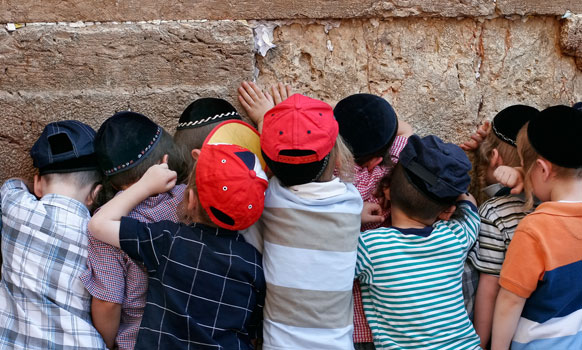
The 16th Cent. Biblical Commentator Who Urged His Readers To Value Female Contributions
Midrashic tradition tells us there are no coincidences, at least in the way the Torah tells its stories. When one verse (Numbers 20:1) says Miriam died and the next reports a lack of water – there is likely a connection between those events that goes deeper than simple chronology. The Talmud (Taanit 9a) explains that indeed, it is no chronological accident that when Miriam was gone, so was the Jews’ water source: they had previously enjoyed a miraculous well in Miriam’s merit; “there was no water for the community” because “Miriam died.”
One might wonder, though, why her merit and the gift it called down for her people should disappear just because she did; is merit a physical thing, that cannot survive the physical body of the one who built it? Don’t we have an ongoing tradition of calling upon the merit of our ancestors in our prayers, though they are long gone?
Perhaps it is this question which motivates the 16th century Biblical commentator’s (the Kli Yakar) further poignant insight:
The water was lacking as a type of punishment, because they didn’t eulogize her appropriately; for regarding Moshe and Aharon, it is said that the children of Israel cried for them, and here it is not said that they cried for her… She was forgotten like the dead from the heart, and they didn’t feel her absence at all; therefore, water was taken from them, so they would know retroactively that the well had been in her merit. (Kli Yakar’s commentary to Numbers 20:2)
The suggestion that the people didn’t fully recognize or appreciate what Miriam did for them, and had to be taught to suffer her absence, is indeed poignant. As the friend who called my attention to this commentary pointed out, it serves as a valuable reminder of the importance of recognizing women’s presence in and contributions to our communities.
On the other hand, it’s worth noting a couple of points in the people’s defense, which might complicate our reading of the text and of Kli Yakars’ comment.
First, Miriam’s death was quiet, while Aharon’s (later in the same chapter) involved a whole production: Moshe brought him and his son up on a mountain “in the sight of the whole congregation… and the entire congregation saw that Aharon had passed…” (20:27, 29). Can we really fault the people for reacting less strongly to Miriam’s quiet death than to Aharon’s public one? (Moshe’s death may have been similarly public, though to a lesser extent. In the interests of space, we will focus just on Miriam’s and Aharon’s.)
Moreover, though Kli Yakar’s comment might seem to imply that the people had established a precedent for mourning their (male) leaders and then didn’t do it for Miriam (because she was a woman?) – in fact, Miriam died before her brothers; there was no precedent.
What, then, can we learn by contrasting the lack of reaction when Miriam died to the later deep mourning for her brothers?
Miriam was the first of the “good sustainers” (Taanit 9a) to pass away; perhaps the withholding of water after her death was intended to teach the people a lesson about recognizing and appreciating all “sustainers.” Kli Yakar’s insight reminds us to give some thought to the countless men and women who impact our lives in ways big and small, public and private, seen and unseen, and to consider the potential impact on our lives if they were to disappear. Perhaps the people of that time, and the readers of the Torah today, might learn to realize that the good we have is often because of others – those who keep the pipes going and the garbage from piling, who manage all the mundane tasks at the edges of our comfortable lives. Those whose absence, were they to quietly disappear, would be felt though we didn’t realize how much they did for us.
Moving from Miriam’s death to that of Aharon, perhaps the Jews in the wilderness learned this gender-neutral lesson: They came to appreciate the role Miriam had played in their lives and the respect she was owed – and they paid that respect in the form of applying what they’d learned from her loss to the loss of her brother, the second “good sustainer” to die.
On the other hand, perhaps we might also note what it was that brought the people to mourn for Aharon – and what it wasn’t.
Numbers 20:29 states that “all the house of Israel cried for Aharon.” Rashi quotes a midrash that explains the extra wording, “all the house of Israel” as emphasizing that both the men and the women cried for Aharon. As Hillel tells us in Avot 1:12, Aharon was a “pursuer of peace”; according to the midrash, “he would bring love between quarrelers and between a man and his wife.” Aharon made a positive difference in the lives of the men and the women, and so they all cried over his loss.
But helping spouses and friends reconcile their differences was not Aharon’s only contribution to his people. The same midrashic tradition that tells us the people had Miriam to thank for the well all those years, also tells us G-d provided the protective Clouds of Glory in Aharon’s merit (and the manna in Moshe’s – but remember, he’s not our topic at the moment). They all were “sustainers”; in their merit, G-d provided these miraculous sources of sustenance for the people.
Several commentators invoke the connection between Aharon and the clouds to explain why the Jewish people were attacked immediately after Aharon’s death (30:1) – because the protection of the clouds had disappeared with his death. The parallel to Miriam’s death and the disappearance of the well is clear: once again, something the people relied on turns out to have been present only because of an individual who is now gone, and the people suffer for it – perhaps for their lack of appreciation.
Maybe they didn’t learn their lesson after Miriam’s death after all.
Let’s consider, then, why the contributions of the well and the clouds wouldn’t have moved the people to mourn. What’s the difference between Aharon’s pursuit of peace and the presence of the well and the clouds? What deeper message can we derive from Kli Yakar’s insight?
The existence of the well was presumably common knowledge, but apparently people didn’t know it was there because of Miriam. It wasn’t an obvious, public contribution that Miriam made to her people. It was not, for instance, as openly visible as her brother’s actions in bringing people together, a pursuit which inherently requires that people know about it. (Even the tradition which states that Aharon would tell white lies to each disputant, convincing each party that the other wanted to reconcile, still has him openly involved in bridging the conflict.) In the case of the well, however – and the Clouds of Glory too – the people simply had no idea whom to thank.
And that brings us back to the gender of our leaders, and really of all who impact our communities in ways big and small. As my friend was inspired by the Kli Yakar to point out, it is crucial that we demonstrate respect and appreciation of women’s contributions to our communities as well as men’s. And the midrashic traditions we’ve explored seem to highlight that we often demonstrate that respect and appreciation more with regard to the public, visible contributions than with regard to the quieter ones we might not even recognize as contributions.
The distinction is understandable – but that doesn’t make it okay. That doesn’t make it enough.
If we don’t recognize the quieter contributions – well, Kli Yakar suggests, we might learn the hard way when those contributions are no more.
Historically, women’s contributions have often been quieter – more private, less visible – more like the well and the clouds that could be so easily taken for granted, and perhaps less like Aharon’s active circulating around the people and making active visible change
But of course, both kinds of contribution can be – and have been, and certainly are today – made by both men and women
And we need to remember to look for, see, recognize, and appreciate both kinds, from whomever.
The Ralbag sees a lesson in the events following Aharon’s death that is similar to the Kli Yakar’s point about the events following Miriam’s death – but with a twist:
This story [of the Canaanite king’s attack] was juxtaposed to the account of Aharon’s death to teach us two things: One, that the death of a righteous person has an impact, and therefore harm befell them immediately [after Aharon died]; and the second, that G-d gave Israel their reward for eulogizing Aharon in this wondrous way, and therefore [they defeated that Canaanite] – as if the Torah is cautioning us with this that we not neglect the eulogy of a righteous person.
Giving the righteous among us their due is one way we might merit G-d’s assistance in rebuilding what they have given us, even after they’re gone.
If you found this content meaningful and want to help further our mission through our Keter, Makom, and Tikun branches, please consider becoming a Change Maker today.







